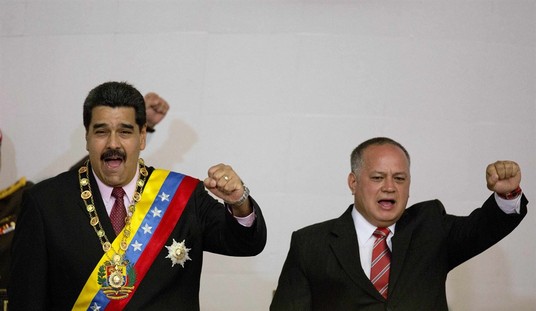You’ve heard of the European Union. What about the Eurasian Union? The Prague Post reports that Vladimir Putin wants the EU to talk to his own supra-national organization.
While speculation in the lead-up to the June 4 European Union-Russia summit focused on whether EU leaders would pressure Russian President Vladimir Putin to act in war-torn Syria, the meeting remained focused on strengthening economic ties between the two key trading partners.
Held in St. Petersburg, it was the first such gathering since Putin returned to the presidency last month. European Council President Herman Van Rompuy and European Commission President José Manuel Barroso represented the EU, and Putin used the opportunity to press for what he called a “Eurasian Union.”
“We are convinced that the setting up of the Customs Union, of the Common Economic Space, and in the future, possibly, of the Eurasian economic union, is fully compatible with the tasks of enhancing cooperation between Russia and the European Union,” he said.
Talk to the Eurasian Union, not Russia, Putin said, as he hosted Presidents Rompuy and Barroso of EU. “Russia has surrendered national competence to a supra-national body,” Putin said. This probably means the opposite: that a number of nations have surrendered their national competence to Putin.
Russia’s President Vladimir Putin made it clear that his country cannot advance negotiations on a new basic treaty with the EU, unless Brussels formalises relations with the so-called “Common Economic Space” – its Customs Union with Belarus and Kazakhstan.
Direct talks are needed between representatives of the EU and the Common Economic Space, because on a range of questions Russia has surrendered national competence to a supra-national body, Putin said at the final press conference of the EU-Russia summit yesterday (4 June) in St. Petersburg.
But diplomacy runs on fiction and the toothless duo of Presidents returned to a Brussels with an ever declining financial base but with the prospect of more authority — ultimately not theirs but on loan from Berlin.
The Telegraph reports that Germany has refused to hand out any more funds to the fast sinking latin countries unless they agree to control from the center. “Germany’s central bank has shot down EU proposals for a European banking union, warning categorically that eurozone liabilities cannot be shared without a fundamental shift towards fiscal and political union.” What that exactly means has now been spelled out.
The Chancellor said countries must be willing to give up sovereignty to an EU banking supervisor for “specific purposes”. This is not the same as a banking union. It is limited to financial policing — either beefing up the EBA’s existing powers or switching the oversight role to the European Central Bank …
“We can’t take part in things that lead us into an even deeper disaster,” she said. “We want more Europe, but a Europe in which joint liability and joint control go hand in hand. What is not acceptable is shared liability and control remaining in national hands.”
That means Barroso and Rompuy are soon to be promoted to the overlords of bankrupt countries. But they will be flunkies with respect to the German chancellor. This makes the prospect of the Eurasian Union in dialog with EU a tad disturbing? It looks an awful lot like Berlin talking to the Kremlin. Which is not a nice thought. It would be ironic if the European project, which was created to prevent just such a scenario should not become the mechanism to facilitate exactly that.
But does Spain have much choice? “Spanish 10-year bond yields jump past 6.8pc, a 13-year high, as German Chancellor Angela Merkel warns that any funds for the country will be tied to reforms of its banking sector.” Without a lifeline they are sunk. Any port in a storm and the only one with a port open is Germany.
The EU leadership is desperate, argues Jose Guardia. As desperate as Spain. He writes that Madrid and Brussels agreed to the Spanish bailout because they are afraid that Greece will blow up the European project outright. But in reality nobody even knows just how much money Spain will eventually need. “It all shows that this bailout was agreed in haste especially because the international community wants to contain the possible damage of an anti-euro party win in Greece next Sunday.”
In that regard, the Spanish bank bailout announcement was a firewall, announced when it only was a proposal: it was basically saying that both Spain and the Eurozone agreed that Spain would ask for it, but it wasn’t a bailout in itself yet. That will happen after the two independent auditors that Spain hired to assess the financing needs of the Spanish banking system deliver their reports next week. Only then the actual figures on interest, maturity and so forth will be decided.
People are lending each other money — and taking it — not in the spirit of prosperous commerce but out of desperation. Of course Russia is mostly broke itself. So too soon will Berlin says Forbes’s Oliver Pursche, who argues that the financial flames are now licking at the German border.
Should Germany’s economy start to contract, and there are early signs that it is, I believe there is a risk that crisis in Europe could deepen and permeate through the globe. Moreover, should Germany slip into a recession, I believe that the political climate will turn sour and make any check writing by Germany to save Greece or others an almost impossible task.
As we approach Greek elections on June 17, the risks of more turmoil will likely increase, after all there are only two potential outcomes to the election. Either, a moderate and sensible group of parties wins enough votes to form a coalition, or the radical left, led by Mr. Tsipras wins.
In the event that early polls prove correct and the left wins, markets are likely to react harshly. This combined with some weakening data in Germany–the “check book” of Europe–is reason to become more defensive.
That would be all everyone needs. Everyone broke in a world awash with grifter, empire building politicians. History, said Mark Twain, “never repeats itself, but it rhymes”. One reason it rhymes is that geopolitical realities are often quite persistent. Geography and national character change but slowly.
And it rhymes quite malevolently. The resemblance between current events with the unlamented past was underscored by Barry Rubin, who wrote that the “the Syrian civil war is the Spanish Civil War of our time”.
In several respects, the Syrian civil war is the Spanish Civil War of our time. It is an exhibition match between two ideological rivals—Shia Islamism and Sunni Islamism—that both want totalitarian dictatorship but cannot co-exist. It is a testing ground for the conflicts to come. Yet it is not a simple battle of good against evil. The Syrian regime is certainly evil, but the rebels are a mixed bag who also include evil forces. It is only the best elements among them that deserve the outside world’s support, help to defeat those who want repressive dictatorship on both the enemy side and on their own side as well.
Yet the democratic outside world is, for all practical purposes, standing passive. The Iranian regime is helping one side with huge amounts of money and arms, as Nazi Germany did for the Franco forces; the Turkish regime and the Saudis are helping the other side a bit, but giving disproportionate assistance to the Muslim Brotherhood, like the USSR gave to the Communists in Spain. Indeed, U.S. policy is aiding the Brotherhood, too.
One can thank God that there’s no longer a Nazi Germany nor a USSR. Or that European armies are so old that the worst problem of the Belgian army is lumbago.
Maybe the democratic world can afford to idle passively watching armies hobble toward each other in their walkers or gaze at one group of Syrians blast the other group of Syrians. If there are any perils left in the world, there’s always Herman von Rompuy, Barroso in Brussels, Nick Clegg and David Cameron in Britain left to face them. And Barack Obama, who was recently told by a TV reporter that he would be a big hit on American idol.
That’s about their speed. Richard Cohen at the Washington Post notes that while the President has lost the veneer of deniabilty with regards intelligence leaks that have been compromising US assets at every turn at least he’s not Richard Nixon. Nor one might add, Scooter Libby.
The New York Times, which broke this particular story, said it had interviewed “three dozen of [Obama’s] current and former advisers,” which suggests the sort of mass law-breaking not seen since Richard Nixon took out after commies, liberals, conservationists, antiwar protesters, Jews and, of course, leakers.
It’s told as a big joke. And maybe it is.When a liberal wants to scare his kids he yells “Nixon! Nixon!”
But the accidental resemblances of the past can’t but help spread a sense of foreboding. The Western leadership has lived so constantly in security that the worst it fears is facing a hostile talk show host and declining polls. What are they really fit for if the SHTF? If the current recession has been openly compared to the Great Depression can one ask the logical corollary: are we comparable to the Greatest Generation? We might be better or worse. But it won’t be fun finding out. It would have been better not to have squandered the heritage.
Belmont Commenters
How to Publish on Amazon’s Kindle for $2.99
The Three Conjectures at Amazon Kindle for $1.99
Storming the Castle at Amazon Kindle for $3.99
No Way In at Amazon Kindle $8.95, print $9.99










Join the conversation as a VIP Member